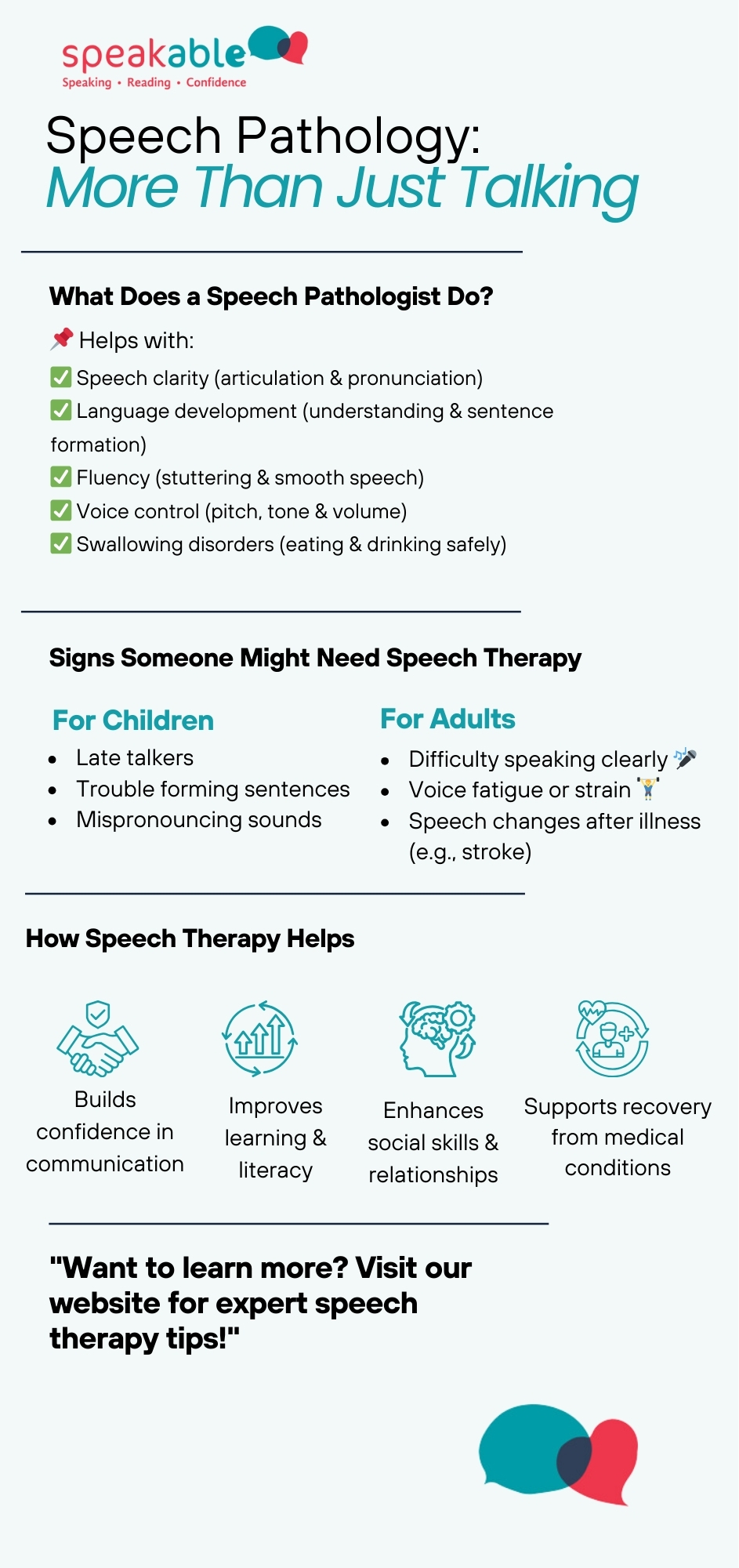What is Speech Pathology? Discover how speech therapy helps children and adults!
 What Is Speech Pathology? Discover How Speech Therapy Helps Children and Adults!
What Is Speech Pathology? Discover How Speech Therapy Helps Children and Adults!
Speech Therapy is NOT Just for "Talking Problems"
When people hear speech therapy, they often think of children who stutter, lisp, or mispronounce words.
But did you know that speech therapy helps with much more than just pronunciation?
Speech pathologists work on:
- Language delays – Helping kids learn to form sentences.
- Social communication – Teaching conversation and interaction skills.
- Voice disorders – Improving pitch, tone, and vocal health.
- Swallowing issues – Assisting with eating and drinking safely.
- Speech clarity – Yes, articulation too!
If you or your child struggle with any aspect of communication, speech therapy could make a huge difference!
What is Speech Pathology and Who Needs It?

Speech pathology focuses on evaluating, diagnosing, and treating communication and swallowing difficulties.
According to the American Speech-Language-Hearing Association (ASHA), speech therapy is recommended for:
- Children who are late talkers or struggling in school.
- People who speak too fast, have a hoarse voice, or find social interactions difficult.
- Adults recovering from stroke, Parkinson’s, or other conditions affecting speech.
- Anyone with difficulty swallowing or managing food and liquids.
Many parents believe speech problems will go away with time, but early intervention is key to building strong communication skills!
The Many Areas of Speech Therapy
Speech therapy covers much more than just pronunciation. Here are some key areas:
- Speech disorders – Difficulty pronouncing certain sounds.
- Language development – Learning how to structure sentences and express ideas.
- Fluency challenges – Overcoming stuttering and hesitations.
- Voice control – Improving tone, pitch, and vocal health.
- Swallowing therapy – Helping with eating and drinking difficulties.
The Mayo Clinic explains that speech therapy is also essential for patients recovering from medical conditions, such as brain injuries, neurological disorders, and developmental delays.
If you or your child face challenges in any of these areas, seeking professional help can make all the difference!
How to Improve Speech Clarity? A Simple Articulation Exercise!

One of the most common challenges is articulation—the ability to speak clearly and be understood.
If you or your child struggle with pronunciation, letter substitutions, or speaking too fast, try this simple exercise:
"Slow & Clear Speech Challenge"
- Choose a tricky phrase, like: "Peter Piper picked a peck of pickled peppers."
- Say it slowly, exaggerating every sound.
- Use a mirror to watch how your mouth moves.
- Repeat it three times, gradually speeding up while keeping clarity.
Why does this work? This exercise strengthens the mouth muscles and improves pronunciation over time!
Final Thoughts: Speech Therapy is About More Than Just Talking!
Many parents believe that speech difficulties will resolve on their own, but that’s not always the case. The earlier a child starts therapy, the easier it is to build strong communication skills!
Next Steps:
- ✅ Observe if there are speech, reading, or social challenges.
- ✅ Try the articulation exercise for better clarity.
- ✅ If issues persist, consult a speech therapist!
Did you find this helpful? Share it with other parents who might need this information! ✨



Because you can.
Suite 10, L2 79-85 Oxford St
Bondi Junction
Mon-Fri 8am-6pm
Sat 9am-4pm